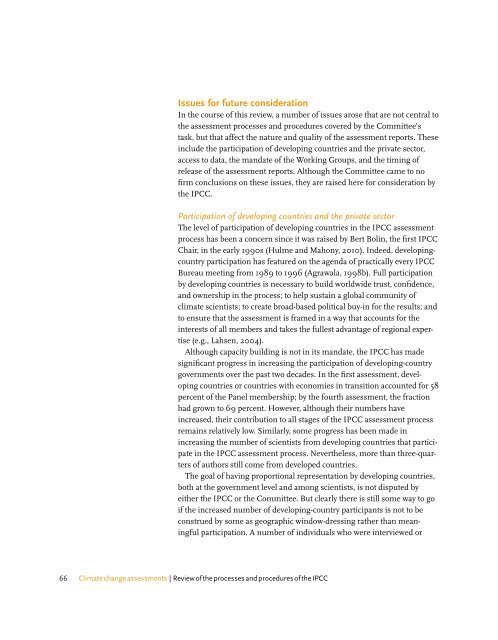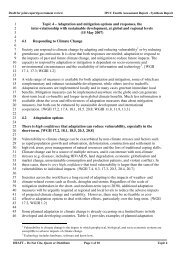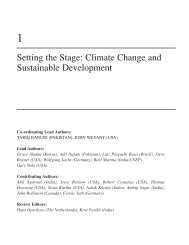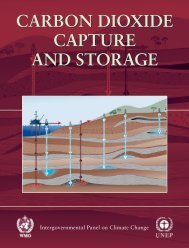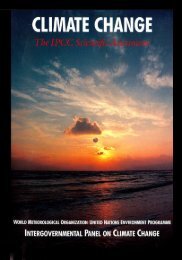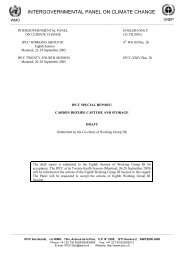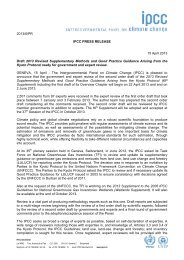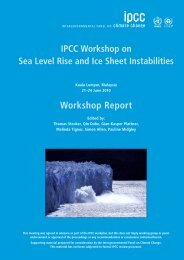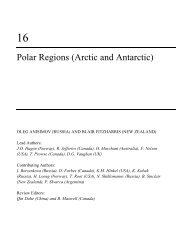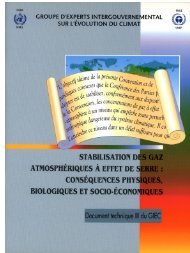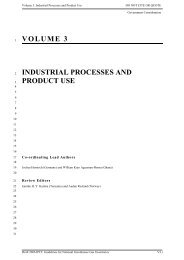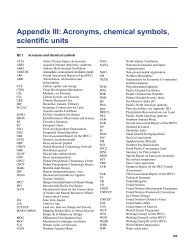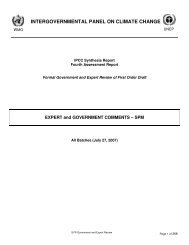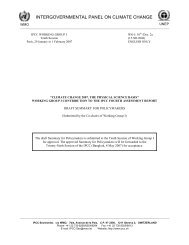Climate change assessments Review of the processes and ...
Climate change assessments Review of the processes and ...
Climate change assessments Review of the processes and ...
You also want an ePaper? Increase the reach of your titles
YUMPU automatically turns print PDFs into web optimized ePapers that Google loves.
Issues for future consideration<br />
In <strong>the</strong> course <strong>of</strong> this review, a number <strong>of</strong> issues arose that are not central to<br />
<strong>the</strong> assessment <strong>processes</strong> <strong>and</strong> procedures covered by <strong>the</strong> Committee’s<br />
task, but that affect <strong>the</strong> nature <strong>and</strong> quality <strong>of</strong> <strong>the</strong> assessment reports. These<br />
include <strong>the</strong> participation <strong>of</strong> developing countries <strong>and</strong> <strong>the</strong> private sector,<br />
access to data, <strong>the</strong> m<strong>and</strong>ate <strong>of</strong> <strong>the</strong> Working Groups, <strong>and</strong> <strong>the</strong> timing <strong>of</strong><br />
release <strong>of</strong> <strong>the</strong> assessment reports. Although <strong>the</strong> Committee came to no<br />
firm conclusions on <strong>the</strong>se issues, <strong>the</strong>y are raised here for consideration by<br />
<strong>the</strong> IPCC.<br />
Participation <strong>of</strong> developing countries <strong>and</strong> <strong>the</strong> private sector<br />
The level <strong>of</strong> participation <strong>of</strong> developing countries in <strong>the</strong> IPCC assessment<br />
process has been a concern since it was raised by Bert Bolin, <strong>the</strong> first IPCC<br />
Chair, in <strong>the</strong> early 1990s (Hulme <strong>and</strong> Mahony, 2010). Indeed, developingcountry<br />
participation has featured on <strong>the</strong> agenda <strong>of</strong> practically every IPCC<br />
Bureau meeting from 1989 to 1996 (Agrawala, 1998b). Full participation<br />
by developing countries is necessary to build worldwide trust, confidence,<br />
<strong>and</strong> ownership in <strong>the</strong> process; to help sustain a global community <strong>of</strong><br />
climate scientists; to create broad-based political buy-in for <strong>the</strong> results; <strong>and</strong><br />
to ensure that <strong>the</strong> assessment is framed in a way that accounts for <strong>the</strong><br />
interests <strong>of</strong> all members <strong>and</strong> takes <strong>the</strong> fullest advantage <strong>of</strong> regional expertise<br />
(e.g., Lahsen, 2004).<br />
Although capacity building is not in its m<strong>and</strong>ate, <strong>the</strong> IPCC has made<br />
significant progress in increasing <strong>the</strong> participation <strong>of</strong> developing-country<br />
governments over <strong>the</strong> past two decades. In <strong>the</strong> first assessment, developing<br />
countries or countries with economies in transition accounted for 58<br />
percent <strong>of</strong> <strong>the</strong> Panel membership; by <strong>the</strong> fourth assessment, <strong>the</strong> fraction<br />
had grown to 69 percent. However, although <strong>the</strong>ir numbers have<br />
increased, <strong>the</strong>ir contribution to all stages <strong>of</strong> <strong>the</strong> IPCC assessment process<br />
remains relatively low. Similarly, some progress has been made in<br />
increasing <strong>the</strong> number <strong>of</strong> scientists from developing countries that participate<br />
in <strong>the</strong> IPCC assessment process. Never<strong>the</strong>less, more than three-quarters<br />
<strong>of</strong> authors still come from developed countries.<br />
The goal <strong>of</strong> having proportional representation by developing countries,<br />
both at <strong>the</strong> government level <strong>and</strong> among scientists, is not disputed by<br />
ei<strong>the</strong>r <strong>the</strong> IPCC or <strong>the</strong> Committee. But clearly <strong>the</strong>re is still some way to go<br />
if <strong>the</strong> increased number <strong>of</strong> developing-country participants is not to be<br />
construed by some as geographic window-dressing ra<strong>the</strong>r than meaningful<br />
participation. A number <strong>of</strong> individuals who were interviewed or<br />
66 <strong>Climate</strong> <strong>change</strong> <strong>assessments</strong> | <strong>Review</strong> <strong>of</strong> <strong>the</strong> <strong>processes</strong> <strong>and</strong> procedures <strong>of</strong> <strong>the</strong> IPCC


